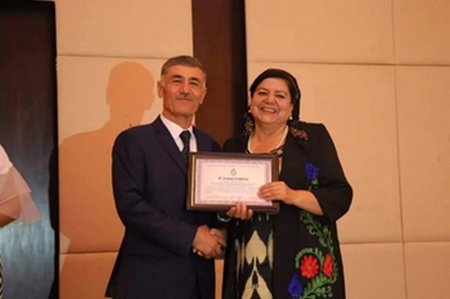



Altynay Abdykerimova (Kyrgyzstan)
Shosaboiyeva Mehrangez (Tajikistan)
Gulnara Bakhtybayeva (Kazakhstan)
Anara Sultangaziyeva (Kyrgyzstan)
Uzakova Shiringul (Uzbekistan)
Kholikzoda Mavdzhuda (Tajikistan)
Nalibayeva Gulzhan (Kazakhstan)
Zholdayakova Saule (Kazakhstan)
Zhenishkul Imanakunova (Kyrgyzstan)
Kundus Kyrbasheva (Kyrgyzstan)
Nurzat Abdyrasulova (Kyrgyzstan)
Eleonora Kazakova (Kyrgyzstan)
Elvira Borombayeva (Kyrgyzstan)
Yulia Kovalevskaya (Uzbekistan)
Umurzokova Kanoathon (Uzbekistan)
Saidkhodzhayeva Malika (Uzbekistan)

Rakhimova Nigina has lived in Nurek all her life; she was born and studied here. In 2000, she graduated from Tajik State University of Commerce and Trade, Department of Economics and Innovative Technologies, majoring in economy.
“The road to the profession was straightforward. As economics is an applied science, its application is in any field of activity. During the holidays, I did an internship at my brother's plant after passing the exams. I really liked being an economist. I started working as an engineer in the Housing and Utilities Department of the Nurek Hydropower Plant back in 1997, combining work and studies. From 2007 to 2020, I worked as a Deputy Housing and Utilities Manager at Nurek HEPP, and I made a significant contribution to the development of the HEPP.” -Nigina said.
“At the beginning of my final school year, I realized that my profession would involve mathematics. My parents advised me to study economics, which was my choice. The choice of direction allowed me to make a decision to choose the Faculty of Economics and Innovative Technologies at the Tajik State University of Commerce and Trade in Dushanbe,” says Nigina. “I did not face any problems because my parents supported me. I'm very grateful to my parents, especially my brother, who supported me a lot. He was an energy engineer. This plant, where I now work as a Director, my brother was the Director. After he retired in 2020, I was asked to head my brother's company.”
“I analyze the options and their consequences before making a decision. As an individual, it is important for me to ensure that my activities benefit others.
I enjoy planning and budgeting, supply chain management, process and cost optimization. A structured and analytical approach is a key success factor. Of course, there should be a desire for constant development and knowledge acquisition – The pace of technological change is rapid and we need to look ahead adapting to new trends” - shares Nigina's opinion.
Recognized success: “Economist are global profession; specialists are needed everywhere: from state-financed organizations to international corporations”.
“Our company works closely with main power plants in Tajikistan-Nurek, Boigozi and Rogun. On the basis of the agreement signed, we supply oxygen to Boigozi and Nurek power plants, and electrical equipment to the Rogun power plant. In our plant workshops we have started production of construction materials from metal and iron wire, including wire netting for bank protection and construction works, iron grids, metal structures for construction of buildings of various purposes, large hydraulic structures and reinforcement of roadsides in mountainous regions of the country.
And our success is that we are known not only in the region, in the country, but also outside it. Today the plant cooperates with various companies and organizations all over Tajikistan. The company cooperates with in-house enterprises for the supply of materials, equipment, machinery and mechanisms” - says Nigina.
"The gender inequity in certain sectors of the economy is often not seen as a problem and it is a big mistake.
When an industry artificially 'throws out' women, it not only leads to a worsening of the position of women in society, but also hinders the development of the industry itself.
Research has shown that occupational segregation (the unequal distribution of women and men in the economy) leads to the exclusion of a large share of the labour force from the labour market. This waste of human resources, in turn, leads to inability to respond to changes in the labour market in a timely manner.
Moreover, research shows that using a gender perspective can significantly improve business innovation, capabilities and productivity, for example by increasing gender diversity within companies and attracting and using talents and skills of women”.